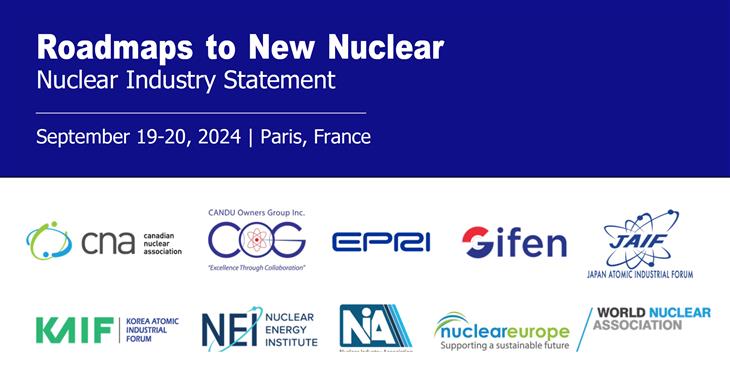World Nuclear Association issues joint communiqué at Roadmaps to New Nuclear
Issued 19 Sepember 2024
Representatives of the nuclear industry in OECD nations issued the following communiqué at the Government-Industry “Roadmaps to New Nuclear” conference organized by the OECD Nuclear Energy Agency (NEA), in Paris on September 19-20, 2024. The communiqué reiterates commitments between government and industry to expand nuclear capacity in line with the COP28 Declaration to Triple Nuclear, as well as calling on the World Bank to finance nuclear projects again.
The communiqué was issued by the Canadian Nuclear Association, the Candu Owners Group Inc., the Electric Power Research Institute, Gifen, Japan Atomic Industrial Forum, Korea Atomic Industrial Forum, Nuclear Energy Institute, nucleareurope, Nuclear Industry Association and World Nuclear Association.
Dr Sama Bilbao y León, Director General, World Nuclear Association, said:
"The communiqué issued today recognizes those OECD member states that signed the Declaration to Triple Nuclear at COP28, and encourages other member states to join. The goal to triple global nuclear capacity has also been embraced by the industry, and through the Net Zero Nuclear initiative, the collaboration between governments and industry has been highlighted as absolutely essential to achieve this ambitious target. The time is now, and urgent action is needed to expand nuclear capacity and provide abundant affordable 24/7 clean energy for everyone."
The text of the Industry Communiqué is presented below.

We, the industry associations representing the nuclear industry attending at the Roadmaps to New Nuclear high-level conference, welcome the opportunity to provide input to government leaders present. We are committed to:
- Ensuring safe and secure operation of nuclear facilities;
- Provide reliable, affordable, clean low-carbon electricity and heat;
- Complementing other low-carbon energy sources in the pursuit of achieving net zero in electricity generation; Decarbonizing hard-to-abate sectors, such as heavy industry; and
- Provide high-quality long-term jobs that drive economic growth.
During the past year, governments around the world have agreed on the important role of nuclear energy to address the climate crisis, ensure energy security and to meet the growing global demands for electricity for high-demand industries such as data centers and AI, energy intensive manufacturing and the electrification of transport, as well as to contribute to the overall global economic development.
We congratulate the OECD-NEA on the success of the inaugural Roadmaps to New Nuclear high-level conference and agree that meeting ambitions for nuclear generation by 2050 will require significant expansion in access to financing, strengthening of supply chains, investment in workforce, further development of the nuclear fuel supply and supportive policies and regulations to enable rapid scaling of nuclear energy generation.
We congratulate those OECD member states that signed the Declaration to Triple Nuclear at COP28. We urge all OECD member states to set out clear plans for nuclear energy deployment that would fulfil the targets they have set through the UNFCCC process and to demonstrate their commitment to nuclear energy, giving clear signals to markets and investors.
We therefore encourage governments to help maximize the use of existing nuclear power plants, including extending the operating period of reactors, uprating their output and restarting those that have shutdown where feasible. Governments should act to accelerate deployment of new nuclear facilities based on proven designs, and accelerate the development, demonstration, and deployment of new nuclear technologies, including new large nuclear reactors as well as Small Modular Reactors and Advanced Modular Reactors.
To help achieve these goals we call on the governments assembled to take decisive action these key areas:
- Promote policies to encourage fleet deployment of nuclear energy technologies to realize the benefits of nth of a kind costs and schedules.
- Ensure ready access to national and international climate finance mechanisms for nuclear development.
- Ensure that multilateral financial institutions, such as the World Bank, include nuclear energy in their investment portfolios and build internal capacity to support these investments.
- Provide clarity to investors on the funding and investment recovery mechanisms available for nuclear projects and include nuclear energy in clean energy financing mechanisms such as green bonds and sustainable energy taxonomies.
- Continue efforts to strengthen supply chains for nuclear fuel in OECD member states to support energy security goals.
- Invest in workforce development and training to develop the next generation of nuclear scientists, technicians and skilled professionals.
- Continue investments in nuclear research and efforts to bolster the nuclear supply chain within OECD member states.
- Expand regulatory cooperation to ensure efficient licensing and accelerated deployment of nuclear technologies.
Nuclear energy holds immense promise for the world, and the member states of the OECD should embrace nuclear deployment as a strategic priority and act now!
Paris, 19 September 2024
See the signed Industry Communiqué here
Photo credit: OECD-NEA